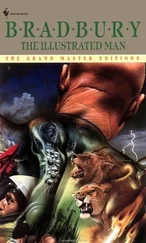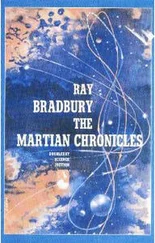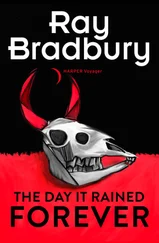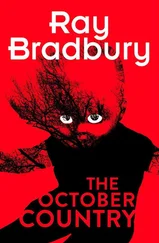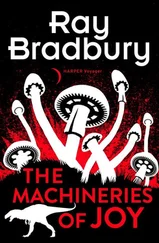And then one child said: “Who are you?”
And gathering his gossamer shroud, the ghastly passenger whetted his imagination, and replied.
It was only the sound of the ferry landing whistle that cut short the long telling of midnight tales. And the parents poured in to seize their lost children, away from the Orient gentleman with the ghastly eyes whose gently raving mouth shivered their marrows as he whispered and whispered until the ferry nudged the dock and the last boy was dragged, protesting, away, leaving the old man and his nurse alone in the children’s playroom as the ferry stopped shuddering its delicious shudders, as if it had listened, heard, and deliriously enjoyed the long-before-dawn tales.
At the gangplank, the Orient traveler said, with a touch of briskness, “No. I’ll need no help going down. Watch!”
And he strode down the plank. And even as the children had been tonic for his color, height, and vocal cords, so the closer he came to England, pacing, the firmer his stride, and when he actually touched the dock, a small happy burst of sound erupted from his thin lips and the nurse, behind him, stopped frowning, and let him run toward the train.
And seeing him dash, like a child before her, she could only stand, riven with delight and something more than delight. And he ran and her heart ran with him and suddenly knew a stab of amazing pain, and a lid of darkness struck her and she swooned.
Hurrying, the ghastly passenger did not notice that the old nurse was not beside or behind him, so eagerly did he go.
At the train he gasped, “There!” safely grasping the compartment handle. Only then did he sense a loss, and turned.
Minerva Halliday was not there.
And yet, an instant later, she arrived, looking paler than before, but with an incredibly radiant smile. She wavered and almost fell. This time it was he who reached out.
“Dear lady,” he said, “you have been so kind.”
“But,” she said, quietly, looking at him, waiting for him to truly see her, “I am not leaving.”
“You …?”
“I am going with you,” she said.
“But your plans?”
“Have changed. Now, I have nowhere else to go.”
She half-turned to look over her shoulder.
At the dock, a swiftly gathering crowd peered down at someone lying on the planks. Voices murmured and cried out. The word “doctor” was called several times.
The ghastly passenger looked at Minerva Halliday. Then he looked at the crowd and the object of the crowd’s alarm lying on the dock: a medical thermometer lay broken under their feet. He looked back at Minerva Halliday, who still stared at the broken thermometer.
“Oh, my dear kind lady,” he said, at last. “Come.”
She looked into his face. “Larks?” she said.
He nodded and said, “Larks!”
And he helped her up into the train, which soon jolted and then dinned and whistled away along the tracks toward London and Edinburgh and moors and castles and dark nights and long years.
“I wonder who she was?” said the ghastly passenger looking back at the crowd on the dock.
“Oh, Lord,” said the old nurse. “I never really knew.”
And the train was gone.
It took a full twenty seconds for the tracks to stop trembling.
He came into Green River, Iowa, on a really fine late spring morning, driving swiftly. His convertible Cadillac was hot in the direct sun outside the town, but then the green overhanging forests, the abundances of soft shade and whispering coolness slowed his car as he moved toward the town.
Thirty miles an hour, he thought, is fast enough.
Leaving Los Angeles, he had rocketed his car across burning country, between stone canyons and meteor rocks, places where you had to go fast because everything seemed fast and hard and clean.
But here, the very greenness of the air made a river through which no car could rush. You could only idle on the tide of leafy shadow, drifting on the sunlight-speckled concrete like a river barge on its way to a summer sea.
Looking up through the great trees was like lying at the bottom of a deep pool, letting the tide drift you.
He stopped for a hotdog at an outdoor stand on the edge of town.
“Lord,” he whispered to himself, “I haven’t been back through here in fifteen years. You forget how fast trees can grow!”
He turned back to his car, a tall man with a sunburnt, wry, thin face, and thinning dark hair.
Why am I driving to New York? he wondered. Why don’t I just stay and drown myself here, in the grass.
He drove slowly through the old town. He saw a rusty train abandoned on an old side-spur track, its whistle long silent, its steam long gone. He watched the people moving in and out of stores and houses so slowly they were under a great sea of clean warm water. Moss was everywhere, so every motion came to rest on softness and silence. It was a barefoot Mark Twain town, a town where childhood lingered without anticipation and old age came without regret. He snorted gently at himself. Or so it seemed.
I’m glad Helen didn’t come on this trip, he thought. He could hear her now:
“My God, this place is small. Good grief, look at those hicks. Hit the gas. Where in hell is New York?”
He shook his head, closed his eyes, and Helen was in Reno. He had phoned her last night.
“Getting divorced’s not bad,” she’d said, a thousand miles back in the heat. “It’s Reno that’s awful. Thank God for the swimming pool. Well, what are you up to?”
“Driving east in slow stages.” That was a lie. He was rushing east like a shot bullet, to lose the past, to tear away as many things behind him as he could leave. “Driving’s fun.”
“Fun?” Helen protested. “When you could fly ? Cars are so boring.”
“Goodbye, Helen.”
He drove out of town. He was supposed to be in New York in five days to talk over the play he didn’t want to write for Broadway, in order to rush back to Hollywood in time to not enjoy finishing a screenplay, so that he could rush to Mexico City for a quick vacation next December. Sometimes, he mused, I resemble those Mexican rockets dashing between the town buildings on a hot wire, bashing my head on one wall, turning, and zooming back to crash against another.
He found himself going seventy miles an hour suddenly, and cautioned it down to thirty-five, through rolling green noon country.
He took deep breaths of the clear air and pulled over to the side of the road. Far away, between immense trees, on the top of a meadow hill, he thought he saw, walking but motionless in the strange heat, a young woman, and then she was gone, and he wasn’t certain she had been there at all.
It was one o’clock and the land was full of a great powerhouse humming. Darning needles flashed by the car windows, like prickles of heat before his eyes. Bees swarmed and the grass bent under a tender wind. He opened the car door and stepped out into the straight heat.
Here was a lonely path that sang beetle sounds at late noon to itself, and there was a cool, shadowed forest waiting fifty yards from the road, from which blew a good, tunnel-moist air. On all sides were rolling clover hills and an open sky. Standing there, he could feel the stone dissolve in his arms and his neck, and the iron go out of his cold stomach, and the tremor cease in his fingers.
And then, suddenly, still further away, going over a forest hill, through a small rift in the brush, he saw the young woman again, walking and walking into the warm distances, gone.
He locked the car door slowly. He struck off into the forest, idly, drawn steadily by a sound that was large enough to fill the universe, the sound of a river going somewhere and not caring; the most beautiful sound of all.
Читать дальше


